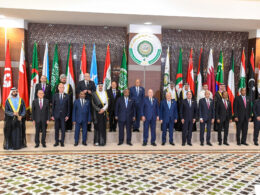Recent days have again shown that, despite the masses’ yearning for real change and freedom and the heroic events of the past months, none of the revolutions in North Africa has so far secured a certain victory.
In Egypt and Tunisia, the countries where dictators were ousted, the ruling classes are making desperate attempts to hang on to their wealth and power.
While Tunisia has seen three governments since Ben Ali’s flight in January and been forced to agree to elections for a constituent assembly, the regime is using what means it can to maintain the rule of the elite. For example, forced to dissolve the old secret police – the State Security Department – they have appointed a new Interior Minister, Habib Essid, who was “chief of cabinet” in the Interior Ministry between 1997 and 2001. As such, he was obviously involved in the tortures, repression and dirty work of the Ben Ali regime.
There is a growing mood among workers and youth that the revolution’s future is at stake which is preparing the ground for new struggles to secure their demands.
Similarly in Egypt the military government that replaced Mubarak has been waging dogged resistance to stem the revolution’s tide. But, as in Tunisia, increasing numbers of workers and youth are seeing, as the CWI warned from the moment of Mubarak’s overthrow, that the military tops are no friend of the revolution. Already the military has announced plans to criminalise many strikes, protests, sit-ins and gatherings of workers and youth.
As seen before in many other countries’ revolutions, Egyptian workers and youth feel that control over events is slipping away and that the old order is attempting to reassert itself. They poured into Tahrir Square again on Friday 8 April in an attempt to regain the initiative. Hundreds of thousands of workers, youth and some military officers, in numbers not seen since immediately after Mubarak’s removal, rallied for a “Friday of Cleansing”. The presence of army officers, disobeying orders not to participate, is a sign that a call to the military rank and file to support the revolution would get a strong response. In the square calls were made for the replacement of the military regime by a civilian council as well as the arrest and trial of Mubarak and other gangsters and torturers from the old regime. Textile workers present put forward their own demands including the removal of the old, state-run, Egyptian Federation of Trade Unions; renationalisation of privatised companies; a LE1,200 (Egyptian pounds) minimum wage (US$ 200) and trial of the corrupt gang including Mubarak and the former head of the official textile workers’ trade union.
The military regime’s response, after the mass of demonstrators had temporarily left the square, was repression. Denouncing some of the protesters as “thugs”, the military brutally attempted to clear the square late on the Friday night, killing at least one protester. Significantly, the deputy leader of the Muslim Brotherhood, Al-Bayoumi, supported the military’s move saying nothing should “jeopardise the unity between the people and the army”. What he really meant by “unity” was the continuing attempt of the Muslim Brotherhood leadership to reach a deal with the military tops. The crackdown continued afterwards. On April 11 a blogger, Mikel Nabil, was sentenced to three years in jail for “publishing false information” and “insulting the armed forces” by publishing an article quoting international news reports that the army had tortured detainees during the revolution.
The military tops may be forced to retreat a bit more, Mubarak and others may go on trial, but their main aim is to safeguard their privileges and the reign of the ruling class. This is why, from the very moment of Mubarak’s removal, the Committee for a Workers’ International warned: “No trust in the military chiefs! For a government of the representatives of workers, small farmers and the poor!” (“Mubarak goes – clear out the entire regime!” 11 February 2011). A few days later we argued that the “Egyptian masses would make a profound mistake to place any trust in those new ‘democrats’, particularly in the state machine – the army generals, their cronies, big business and the landlords – who furnish the basis of the regime. At best, these forces hanker after a ‘controlled’ democracy, something less even than the Erdogan regime in Turkey. The army has, in effect, carried through a ‘soft coup’ following Mubarak’s demise … No trust or faith should be placed in the army tops. The independent power of the masses must be built to exert the necessary pressure.” (“Revolution must continue. Army cannot guarantee democracy” 15 February, 2011)
Building the working masses’ independent power is the key to these revolutions succeeding in transforming the lives of the majority of Egyptians and Tunisians. Without this, control will remain in the hands of the ruling class and elites, who will inevitably move sooner or later towards repression to maintain their rule. Only through building mass organisations, including free, combative trade unions and especially an independent party, can the genuine revolutionaries, workers, youth, small farmers and the poor create the instruments with which to fight the old guard’s attempts to retain power and to create a real alternative, namely a government formed by representatives of workers, small farmers and the poor.
Libya
The absence of such organisations in Libya has contributed to the present derailment of the revolution there as February’s initial mass upsurge did not succeed in the western part of the country around Tripoli. Partly this was because the Gaddafi regime still has some basis of support, but mainly as a result of the revolution having no clear leadership. An important factor was when some of the rebels in eastern Libya adopted the old monarchist flag. The former king had come from Benghazi, and this symbol had limited appeal in Libya’s largest city, Tripoli, and was seen by many as opening the door to renewed foreign control, not just in Libya but throughout the region. The sidelining of the more radical elements in Benghazi and the formation of the self-appointed, imperialist backed, Interim National Council (INC) by a combination of pro-capitalist elements and defectors from the Gaddafi regime also limited the revolt’s appeal to those who, while opposing Gaddafi’s gang, feared the loss of the improvements made in education, health and other areas over the last 40 years.
With only limited anti-Gaddafi movements in western Libya, where two-thirds of the population live, there is, for now, effectively a stalemate. While the African Union’s peace plan was rejected it is now increasingly likely that, for at least a limited period, Libya will effectively be divided. Despite the original claim that it was intervening to defend civilians, it is now increasingly clear that the UN/Nato intervention is supporting the more reliably pro-imperialist side in this conflict in an attempt to remove Gaddafi who, at best, they previously regarded as an unreliable ally.
The Financial Times, a strong supporter of the intervention in Libya, accidently revealed its real motives when it argued that “further military action in the region to protect UK interests” is possible (Editorial, 8 April, 2011). As the CWI previously argued, Tunisia and Egypt showed that tyranny can be overthrown by mass movements. The world powers’ near- silence on the continuing repression in Bahrain, and their only limited criticism of the Syrian regime’s increasingly bloody crackdown, shows how their concern for civilians is limited to when it is in their own class imperialist interests to criticise a regime.
In different ways the revolutions in North Africa and the Middle East are at or approaching new turning points. In countries like Bahrain, Libya, Syria and Yemen the immediate questions are how to move forward, overthrow the dictatorships and what then needs to be done to meet the demands and aspirations of the mass of the population. How this can be achieved, along with removing the remaining vestiges of the old regimes, is the central issue facing the revolutions in Tunisia and Egypt.
The answer to these questions, and saving the revolutions, lies in the hands of the working masses. Tunisia and Egypt have already shown that determined struggle can overthrow dictatorships. However the events this year have shown that, on its own, willingness to struggle is not enough. The working masses need to be independently and democratically organised in trade unions and a mass party of workers and the poor with a clear programme, to be able to struggle to prevent the gains of their revolutions being snatched away by elements of the old elite or a new elite in formation, in collaboration with imperialism.
Genuinely revolutionary forces of the working masses need to reject any alliance with pro-capitalist forces or reliance on the UN or NATO. To defeat dictatorial regimes workers and youth need to build their own forces that can carry the revolution to victory, a victory that not only wins democratic rights but which ensures that society’s wealth is genuinely owned by the masses and democratically controlled and managed in their interests.
This would lay the basis for liberation and a genuine democratic socialism, not the fake versions of it under Gaddafi and in Syria. This could then be an example for the working masses in the Middle East, Africa and beyond to follow in order to end the rule of autocrats and the misery of capitalist rule.












